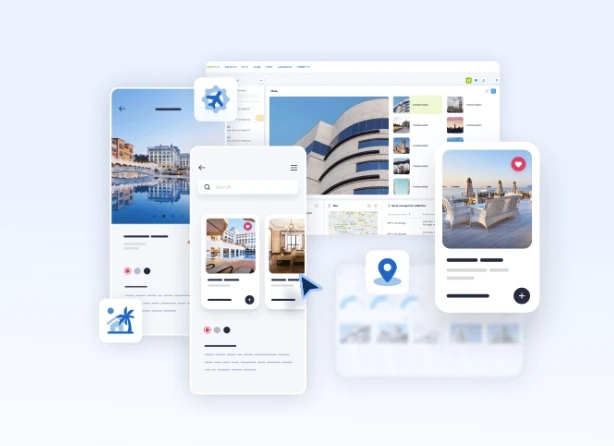The hospitality industry has always been about delivering memorable guest experiences. But in recent years, the way hotels and resorts operate has been undergoing a significant transformation, driven by technology. From automation and artificial intelligence (AI) to cloud-based solutions and advanced analytics, hospitality software development is no longer a support function—it is central to competitive advantage. Understanding and integrating emerging trends is crucial for hoteliers aiming to stay ahead in a rapidly evolving marketplace.
This article explores the key trends shaping the future of hospitality software development and provides actionable insights for hotels and resorts looking to embrace technological innovation.
1. The Rise of AI and Machine Learning in Hospitality
Artificial intelligence (AI) and machine learning (ML) are no longer futuristic concepts—they are being integrated into everyday hospitality operations. From predictive analytics to personalized guest experiences, AI is transforming how hotels operate.
Predictive Analytics for Guest Preferences
AI-powered systems can analyze vast amounts of guest data to predict preferences and behavior. For example, machine learning algorithms can identify patterns in booking history, room choices, dining preferences, and even social media activity. This enables hotels to tailor offers and recommendations to each guest, enhancing the overall experience and increasing loyalty.
Chatbots and Virtual Assistants
AI-driven chatbots are revolutionizing customer service in the hospitality sector. They can handle routine inquiries, booking confirmations, and even concierge services 24/7. This not only reduces operational costs but also allows hotel staff to focus on more personalized interactions with guests.
Dynamic Pricing Models
AI enables dynamic pricing strategies based on demand, seasonality, and competitor rates. Hotels and resorts can optimize revenue by adjusting room rates in real-time, ensuring maximum occupancy and profitability.
2. Cloud-Based Solutions for Seamless Operations
Cloud technology has transformed software deployment and management across industries, and hospitality is no exception. Hospitality software development increasingly relies on cloud-based platforms for operational efficiency and scalability.
Centralized Data Management
Cloud-based solutions allow hotels to centralize guest information, inventory, staff schedules, and financial data in a single platform. This ensures that all departments have access to real-time information, improving coordination and reducing errors.
Scalability and Flexibility
Cloud software is inherently scalable, allowing hotels to expand operations or add new services without major infrastructure changes. This is particularly valuable for hotel chains and resorts with multiple properties, enabling seamless integration across locations.
Remote Access and Mobility
Cloud systems empower staff to access operational tools from anywhere, whether on a mobile device, tablet, or laptop. This is especially useful for hotel managers who need real-time insights into performance metrics, housekeeping status, and guest requests.
3. Personalization and Guest-Centric Experiences
In the modern hospitality landscape, personalization is no longer a luxury—it is an expectation. Advanced software development is enabling hotels to deliver hyper-personalized experiences that resonate with guests.
Smart Room Technology
Smart rooms equipped with IoT devices can adjust lighting, temperature, and entertainment settings based on guest preferences. These systems can even integrate with mobile apps, allowing guests to control room settings remotely.
Tailored Marketing and Promotions
With integrated customer relationship management (CRM) and hospitality software development tools, hotels can segment guests based on behavior, demographics, and preferences. Personalized marketing campaigns, loyalty programs, and exclusive offers drive engagement and repeat bookings.
Enhanced Check-In and Check-Out Experiences
Self-service kiosks and mobile check-in/check-out systems reduce wait times and improve convenience. Guests appreciate the autonomy, while hotels benefit from streamlined operations and lower staffing costs.
4. Internet of Things (IoT) Integration
The Internet of Things (IoT) is redefining the way hotels interact with their environments and guests. IoT devices create connected ecosystems that enable real-time monitoring and automation of various hotel functions.
Smart Energy Management
IoT-enabled sensors can monitor occupancy and adjust heating, cooling, and lighting systems accordingly. This reduces energy consumption and operational costs while contributing to sustainability initiatives.
Predictive Maintenance
IoT devices can detect wear and tear on equipment, predicting maintenance needs before breakdowns occur. This proactive approach minimizes downtime, enhances guest satisfaction, and reduces repair costs.
Enhanced Guest Engagement
IoT integration enables personalized services, such as sending notifications about available amenities, room service options, or local events. Guests experience a seamless and interactive stay, increasing overall satisfaction.
5. Mobile-First Strategies
Mobile technology is central to modern hospitality experiences. Travelers increasingly rely on smartphones for booking, check-ins, in-room controls, and local recommendations. Hotels that prioritize mobile solutions gain a competitive edge.
Mobile Booking Platforms
A responsive mobile booking system allows guests to reserve rooms, select packages, and make payments directly from their devices. Integration with hotel management software ensures real-time availability and pricing.
In-App Guest Services
Hotels are developing mobile apps that provide room service ordering, spa bookings, and concierge requests in a single platform. Mobile-first strategies not only enhance convenience but also encourage upselling and increased revenue.
Contactless Payments
Mobile payments and digital wallets provide guests with secure, seamless transaction options. Contactless payment solutions are especially important in post-pandemic travel, where health and safety remain top priorities.
6. Enhanced Data Security and Compliance
As hotels collect increasing amounts of personal data, ensuring robust security measures and compliance with regulations is paramount. Hospitality software development must prioritize cybersecurity to protect sensitive information and build guest trust.
Encryption and Secure Payment Gateways
Secure encryption protocols and PCI-compliant payment systems safeguard financial transactions and guest data. Regular software updates and vulnerability assessments minimize risks.
GDPR and Privacy Compliance
Hotels must comply with global data privacy regulations such as GDPR and CCPA. Advanced software platforms can automate compliance processes, including data retention, consent management, and breach reporting.
Risk Monitoring and Incident Response
Proactive monitoring tools detect suspicious activity and potential breaches in real-time. Effective incident response plans ensure rapid mitigation, minimizing reputational and financial damage.
7. Integration of Advanced Analytics
Data-driven decision-making is transforming hospitality management. Advanced analytics tools provide insights into guest behavior, operational efficiency, and financial performance.
Operational Analytics
Analytics platforms track key performance indicators (KPIs) such as occupancy rates, average daily rates, and revenue per available room. Managers can make informed decisions on staffing, pricing, and inventory management.
Guest Experience Analytics
Analyzing guest feedback, reviews, and social media interactions allows hotels to identify pain points and opportunities for improvement. Personalized experiences based on this data drive satisfaction and loyalty.
Predictive Business Insights
Predictive analytics can forecast trends in bookings, cancellations, and seasonal demand. This enables proactive planning, optimized pricing strategies, and effective marketing campaigns.
8. Sustainability and Green Technology
Sustainability is no longer optional in hospitality—it is a key differentiator. Modern hospitality software development integrates solutions that reduce environmental impact and promote eco-friendly practices.
Energy and Resource Management
Automated systems monitor energy, water, and waste usage. Hotels can optimize resource consumption while reducing costs and environmental impact.
Green Certifications and Reporting
Software platforms can track sustainability initiatives and generate reports for certifications like LEED or Green Key. This enhances brand reputation and attracts environmentally conscious travelers.
Promoting Eco-Friendly Guest Choices
Hotels can encourage guests to participate in sustainability programs through app notifications, rewards, and incentives. This strengthens engagement and supports corporate responsibility goals.
9. Cloud-Based Collaboration and Workforce Management
The hospitality industry is highly labor-intensive, and effective workforce management is crucial. Advanced software solutions streamline staff scheduling, task management, and internal communication.
Optimized Staff Scheduling
AI-driven scheduling tools predict peak periods and adjust staffing levels accordingly. This improves efficiency and ensures consistent service quality.
Task Automation and Workflow Management
Automated workflows for housekeeping, maintenance, and front-desk operations reduce manual workload and minimize errors. Staff can focus on guest-facing activities, improving overall satisfaction.
Remote Team Collaboration
Cloud platforms enable teams across multiple properties to collaborate seamlessly. Managers can share real-time updates, coordinate tasks, and monitor performance from anywhere.
10. Virtual Reality (VR) and Augmented Reality (AR)
VR and AR are emerging as innovative tools to enhance guest experiences and marketing strategies.
Virtual Property Tours
VR technology allows potential guests to explore rooms, amenities, and facilities before booking. This immersive experience increases confidence in bookings and reduces cancellations.
AR-Based Guest Engagement
AR applications provide interactive guides, in-room entertainment, and local recommendations. Guests can access immersive content through mobile devices, enhancing engagement and satisfaction.
Staff Training and Simulation
VR and AR tools can also be used for staff training, simulating real-life scenarios for customer service, emergency protocols, and operational procedures. This improves staff preparedness and service quality.
Conclusion
The future of hospitality software development is driven by innovation, personalization, and efficiency. Hotels and resorts that embrace AI, cloud computing, mobile-first solutions, IoT, advanced analytics, and sustainability initiatives will gain a significant competitive edge. By integrating these emerging technologies, hospitality providers can deliver exceptional guest experiences, optimize operations, and stay ahead in an increasingly digital marketplace.
Investing in hospitality software development is no longer optional—it is a strategic imperative for any hotel or resort aiming to thrive in the future of travel. The key lies in not just adopting technology but integrating it thoughtfully into every aspect of operations, ensuring that both guests and staff benefit from smarter, more seamless experiences.



